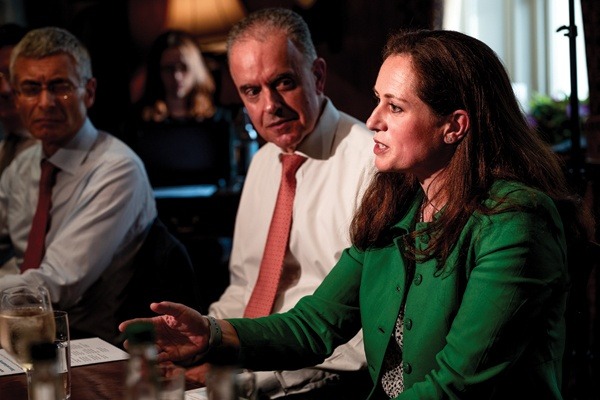Any lawyer of a certain vintage can recall the dawn of the BlackBerry age, the watershed moment at the turn of the Millennium that meant you could always be on call. It was a blessing and a curse. But the initial freedom of being able to work anywhere at any time has become a crippling 24/7 expectation for many, with the inability to ‘switch off’ being an oft-cited issue.
Kate Dodd, diversity and inclusion consultant at Pinsent Masons, says: ‘There’s an attitude among some lawyers of: “If I take my eyes off the emails for one minute I might miss a great opportunity”. But do we always need to be going at that speed?’
The focus on mental wellbeing has intensified in most forms of public life, but the legal sector has been slower on the uptake. In a Law Society Junior Lawyers Division survey in April, 48% of trainees reported suffering from poor mental health, a notable jump upwards from the 38% that reported the same last year.
But a recent development has given cause for optimism: Pinsents and Addleshaw Goddard teamed up with Barclays to develop the Mindful Business Charter (MBC), an initiative aimed at reducing unnecessary stress for in-house and external lawyers. Eleven signatories initially committed to the charter, including Lloyds Banking Group and NatWest, as well as eight law firms. That number is a small minority in the context of Barclays’ 100-strong external advice panel. But with the bank now counting more than 2,700 staff as full-time legal employees – split between 840 in-house and a further 1,900 FTE externally – the initiative has scale given the gravitas Barclays carries in fronting the MBC.
Barclays’ head of legal for regulated and unregulated spending, Philip Aiken, comments: ‘The genius of the MBC is that it is a charter agreed by external service providers and clients. From a Barclays perspective, I was acutely aware of our leverage – for some of our panel law firms we are their biggest client – so if we said “we are signing up to this”, it would be incredibly impactful.’
But laudable sentiment aside, what impact has the MBC already had and what can the charter meaningfully achieve?
We do it to ourselves
The MBC was born out of a conversation between Pinsents’ senior partner, Richard Foley, and Aiken about a year ago. Aiken recalls: ‘We were talking about mental health in the workplace, more particularly the stresses under which lawyers both in-house and in private practice work, and the fact that this is something that we do to each other. Isn’t there a way in which we can work more effectively to reduce those instances of avoidable stress?’
Plans were then in motion to draw up the charter, with both Pinsents and Addleshaws playing a pivotal role in its formation. Originally a much lengthier document, it has since been pared back to one side of A4 covering the commitments of both the individual lawyer and their organisation (irrespective of whether they are in-house or private practice). These include statements on openness and respect, smarter approaches to meetings and emails, respecting rest periods and a ‘mindful approach’ to delegating work (see box, page 45, for the charter in full).

Kate Dodd, Pinsent Masons
The trio of Barclays, Addleshaws and Pinsents then held workshops with banks and other law firms to promote the charter. Once completed, a range of additional founding members were signed up: Lloyds, NatWest, Ashurst, Baker McKenzie, Clifford Chance (CC), Eversheds Sutherland, Hogan Lovells and Simmons & Simmons. There was a methodology behind the original line-up, with NatWest and Lloyds adding to the credibility as significant household-name employers. As for the firms, Aiken says they were selected due to their previous commitments to tackling mental health issues, while observers speculate they were the providers being sent the most work.
Dodd recognises the crucial client role, but says some firms were reticent to get involved: ‘Some fear it would put them at a competitive disadvantage – there’s a misconception that we are all going home at five o’clock. Some firms have said: “It’s alright for a firm like Pinsents, but not us.”’
To challenge this perception, Barclays has insisted on the charter being a requirement for its legal adviser panel, with the ultimate aim to get every partner firm signed up. Aiken asserts: ‘There is nothing controversial in the MBC. It’s difficult to disagree with any aspect of it. If we did encounter resistance then that prompts the question of “Why?” But I haven’t had a difficult conversation around this yet.’
But rather than threatening firms to sign up, willingness to embrace the MBC is also being actively rewarded. Melissa Fogarty, co-head of CC’s London corporate team, came in for praise from Aiken after using the charter to meet Barclays’ wider demands on pricing arrangements. She notes Barclays’ insistence on firms ‘moving beyond the billable hour’ and says: ‘Our price was determined against certain KPIs. Therefore it’s relevant to take into account how well Barclays has lived up to the MBC, such as being clear about deadlines, giving time to do the work and maintaining a work/life balance. We could use the pricing model to create an even greater incentive to work within the charter.’
As the charter passed its six-month anniversary in April, the collective efforts of Barclays, Pinsents and Addleshaws culminated in a 9 May external launch event. An additional nine law firms signed up to the charter, bringing the total number of signatories to 20. The new members are: Freshfields Bruckhaus Deringer, Herbert Smith Freehills, CMS, DWF, Michelmores, Osborne Clarke, Stone King, Weightmans and Capsticks. Tellingly, however, additional clients are yet to come on board.
Fitter happier
A new wave of signatories underlines the attractiveness of the pitch, but just how well the charter has worked in changing behaviours is harder to ascertain. Even some of the MBC’s biggest advocates admit to doubts, with one privately conceding: ‘I just knew how lawyers worked, so I thought the charter was never going to work. I was one of the biggest cynics.’
Significantly, Lloyds and NatWest were unwilling to interview for this feature, instead providing bland written statements. Lloyds will not even be forcing its panel firms to sign up. It is very difficult to measure the success of the charter, because everyone has a different idea of what that success looks like. No-one interviewed could provide clear yardsticks or quantitative ways of measuring the charter’s impact, beyond seeking feedback.
Dodd, who dismisses the idea of studying attrition rates as a ‘blunt instrument’, has surveyed Pinsents’ lawyers to grasp whether their experiences matched the ambitions of the MBC. Lawyers have been asked to rate the extent to which they have been respected on certain aspects of the charter.
Dodd reports: ‘The feedback has been mostly positive but we did have pockets of people who felt their annual leave wasn’t being respected.’ This highlights a stark truth: ultimately the charter relies on the client to uphold their side of the deal. But there are ways to smooth things out, according to Dodd, including a review document that the firm’s lawyers can sign at the end of every mandate to let their thoughts be known. She says clients are encouraging lawyers to provide feedback and the MBC is a firm agenda point at quarterly relationship review meetings.

Melissa Fogarty, Clifford Chance
For Barclays’ part, Aiken is transparent about where it needs to improve: ‘To be frank, we’ve had a couple of examples where clearly we haven’t lived up to the principles of the MBC, and it’s really important to hear that feedback because honesty and effective and transparent communication is what the MBC is predicated on.’
Pinsents banking partner Matt Morgan is far from effusive: ‘Because we have a lot of focus on wellbeing already there’s been no huge day-to-day changes.’ A charitable onlooker would point out the initiative is in its infancy, only celebrating its six-month anniversary in mid-April.
Addleshaws head of talent and learning Mary Peterson is more on message, observing: ‘Clients are walking the walk. We’ve seen them extending non-urgent deadlines and our lawyers are reporting a more positive and collaborative relationship.’
Ultimately, hard data is lacking. Hogan Lovells UK managing partner Susan Bright concedes ‘it is difficult to measure success’ but offers a practical change she has made as a result of the charter: ‘First thing on a Saturday morning I tend to catch up on emails. But I realised by responding to emails at the weekend I was causing other people stress. I still prepare the emails, but they go into my drafts instead and I send them out on Monday morning.’
She adds: ‘It was really helpful someone felt able to say to me: “Do you realise what impact this is having on me?”’ For her, the charter has been successful in so far as internal and external colleagues are more willing to have such conversations. Bright, who is a non-executive director at the City Mental Health Alliance, speaks with a genuine passion about mental wellbeing. Notably, she intends to embed the MBC into Hogan Lovells’ training regime.
Eversheds Sutherland managing partner Keith Froud concedes it is unrealistic for lawyers to completely switch off from their mobile phones: ‘Why should any client not expect us to be really responsive when we need to be?’
But, as many surveyed for this feature have argued, this is not the purpose of the charter. Rather than a set of rules seeking to eliminate stress, proponents have painted it as a more iterative process aimed at reducing unnecessary stress. Froud uses a mix of metaphors to convey this point: ‘You can’t always be the hamster on the wheel wanting to go faster. Compare it to a high-class athlete – the downtime between training is as important as the training.’

Keith Froud, Eversheds Sutherland
In terms of measuring success, Froud notes that some of his internal teams already track the number of emails being sent by lawyers, but plays down its effectiveness as a solution: ‘That’s certainly one thing which we can track but it’s not going to solve everything. Just because people send a few less emails doesn’t mean they’re fine.’
So despite Bright’s personal mission, the charter is not just about not sending emails at the weekend – flexible working arrangements might mean that is the only time some people can send them – but about being clear on deadlines and response times.
Ugly ambition
There can be no doubt that the MBC is a well-intentioned campaign. But as much as technology may have exacerbated these mental health issues, these are historical problems with the profession. Fogarty contends: ‘It’s not because there’s been a huge increase in [poor mental health], it’s always been a major issue in the industry. The difference now is that people are brave enough and the organisations are open enough for people to do something about it.’
Peterson maintains that lawyers are particularly prone to mental struggles: ‘They’re high achievers and perfectionists and people trained to look for risk. All of that can be a predisposition to poor mental health.’
It is certainly true that the stigma around public discussion of mental health is slowly disappearing, but this has not meant that mental health as an issue has avoided becoming another of the generally tepid, platitudinal campaigns that dog the legal industry. Take social mobility as an example: the much-lauded PRIME initiative, launched to much fanfare in 2011, saw 23 law firms commit to improving work experience opportunities for disadvantaged youngsters. Eight years on, the majority of signatory law firms can barely remember what PRIME is.
The true test of the MBC will be whether it can avoid being similarly lost to time, which will require sustained activism and hard data. Big-name backers like Barclays means a healthy start is guaranteed, and if it can overcome the immediate hurdles of quantifying success and delivering on its ambitions, the charter could provide a valuable first step on a long journey the profession has for years avoided taking.
Froud concludes: ‘None of this is about not working hard, that’s the point: we’re in high-performing organisations, I don’t know of any high-performing organisation in the world where its people don’t work hard. It’s about giving thought to how we do that and working hard in the most effective way possible, supporting ourselves and each other. It’s about sustainable high performance.’
Hamish McNicol
The Mindful Business Charter in full
The organisation’s commitment:
- Drive forward the actions and change necessary to support the Mindful Business Charter.
- Promote a culture where people can speak up early about any concerns they might have with their wellbeing (or the wellbeing of colleagues).
- Make performance against the Mindful Business Charter/responsible business a priority, standing-agenda item for all relationship review meetings. Ensure responsible business is included as an area of assessment during significant procurement processes.
- Once established, introduce the Mindful Business Charter to one new member every 12 months.
Openness and respect
Building trust and effective communication:
- Discussing upfront with my colleagues, clients and contacts their preferred method of communication and clarifying any relevant implications of an individual’s working patterns.
- Treating internal colleagues and external contacts with the appropriate level of respect and courtesy.
- Asking for and providing feedback to others on a regular basis.
Smart meetings and emails
Adhering to smart meeting and email guidance:
- Allowing people to join meetings by the method they deem suitable, providing dial-in details as default on meeting invites unless it is imperative that everyone attends in person.
- Being respectful of others’ time by planning meetings properly (considering who needs to attend/giving appropriate notice/setting clear agendas and objectives) and avoiding last-minute cancellations.
- Avoiding over-use of email and not copying people into emails that they don’t need to receive.
- Making use of subject lines in emails and ensuring these are reflective of the email’s content.
Respecting rest periods
Consideration given to the need to ‘switch off’:
- Where support is required outside of someone’s core working hours, giving them options for when that could be (early morning or evening/weekend).
- When sending emails outside of business hours, being clear in the title whether it needs to be read/actioned promptly or considering sending pre-timed emails (so emails are not received late at night and at weekends).
- Including working hours/availability as part of my email signature, so people are aware of each other’s working patterns.
- Respecting people’s right to take annual leave without the expectation of them checking emails/being on call, and role modelling the same behaviour myself where possible.
Mindful delegation
Implementing a best practice approach to collaboration, instruction and delegation:
- Respecting the need to provide sufficient context and information for a piece of work, ideally including the purpose and ultimate recipient.
- When instructing on a task, negotiating rather than imposing a deadline, being transparent where possible on the wider timetable, and promptly communicating timing changes which impact others.
- When being instructed on a task, being confident to flag when a deadline is unrealistic and/or unachievable.


